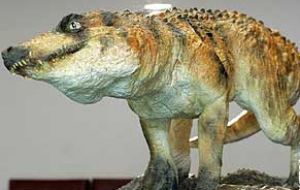MercoPress. South Atlantic News Agency
Crocodiles' possible “missing link” presented in Rio
 "Montealtosuchus arrudacamposi" a prehistoric crocodile
"Montealtosuchus arrudacamposi" a prehistoric crocodile The fossil of a land-bound reptile that could be a link between prehistoric and modern-day crocodiles was put on public display for the first time at the Federal University of Rio do Janeiro, reports National Geographic.
Paleontologist Felipe Mesquita de Vasconcellos presented the 80-million-year-old predator, dubbed Montealtosuchus arrudacamposi, during a news conference at the University. The remains were found in 2004 near the small Brazilian city of Monte Alto, about 346 kilometers northwest of São Paulo.
The 1.6-meter-long Montealtosuchuswas a long-limbed and extremely agile animal that roamed arid terrain in what is now the Brazilian countryside instead of living in marshlands and spending most of its time in the water, de Vasconcellos said.
"As a missing link to prehistoric crocodiles, it offers us an excellent opportunity to study the evolutionary transition of these animals" de Vasconcellos said. "It has a mix of morphological traits common in prehistoric crocodiles and in the ones that exist today."
"Its nostrils were at the front (of its snout). If it went in the water it had to keep its head erect making it an easy target for other predators. Its eyes were placed laterally, like other land-walking animals" said de Vasconcellos.
He said these characteristics made the Montealtosuchus arrudacamposithe "missing link" of crocodiles.
The discovery could also lead paleontologists to revise theories that place the origin of crocodiles in the northern hemisphere, where no fossils of such "intermediary" species have been found, he added.
"Perhaps the origin of crocodiles around the entire world was in the south and not in North America or Europe as it was always believed" de Vasconcellos told reporters.
"They may have first appeared in South America or Africa, when they were fused together in a single continent. That would change the way an entire species has propagated."
Details of the discovery were published in October 2007 in




Top Comments
Disclaimer & comment rulesCommenting for this story is now closed.
If you have a Facebook account, become a fan and comment on our Facebook Page!